UGB264 Report: Corporate Responsibility and Food Industry Analysis
VerifiedAdded on 2023/06/08
|10
|3636
|316
Report
AI Summary
This report delves into the complexities of corporate social responsibility (CSR) and sustainability within the food industry. It begins by defining CSR and sustainability, highlighting their interconnectedness, and then identifies key challenges faced by food industry corporations. These challenges include balancing profit maximization with social welfare, addressing consumer perceptions, managing input-output imbalances in sustainable practices, and tackling issues like food packaging and waste. The report then analyzes best practices in the industry, such as sustainable packaging, effective waste management, and charitable initiatives. It also emphasizes the importance of ethical food production, sustainable sourcing, and the need to address ethical issues in areas like seafood production. The report concludes with recommendations for food businesses to enhance their ethical responsibility and sustainable practices, emphasizing the need for a holistic approach that considers global impacts.
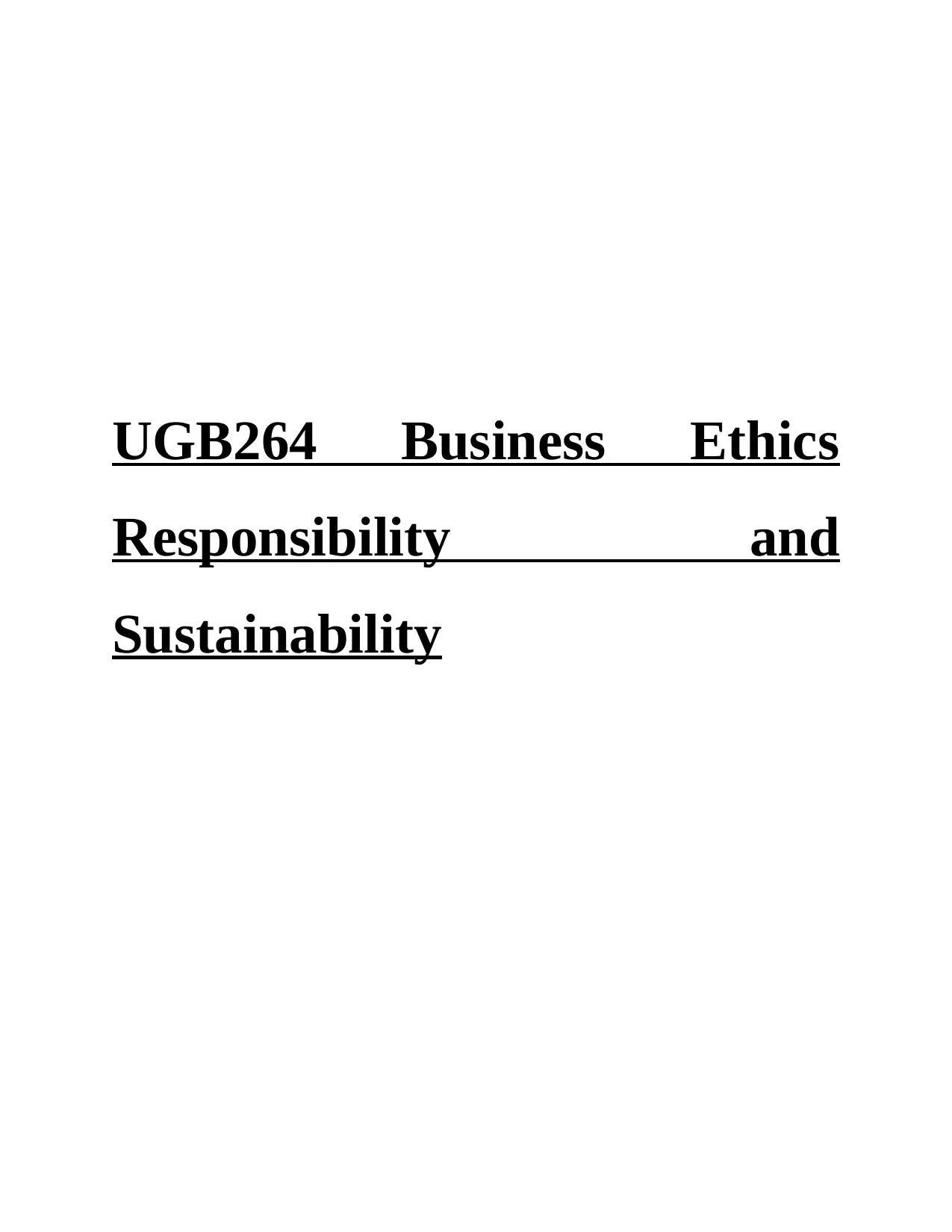
UGB264 Business Ethics
Responsibility and
Sustainability
Responsibility and
Sustainability
Paraphrase This Document
Need a fresh take? Get an instant paraphrase of this document with our AI Paraphraser
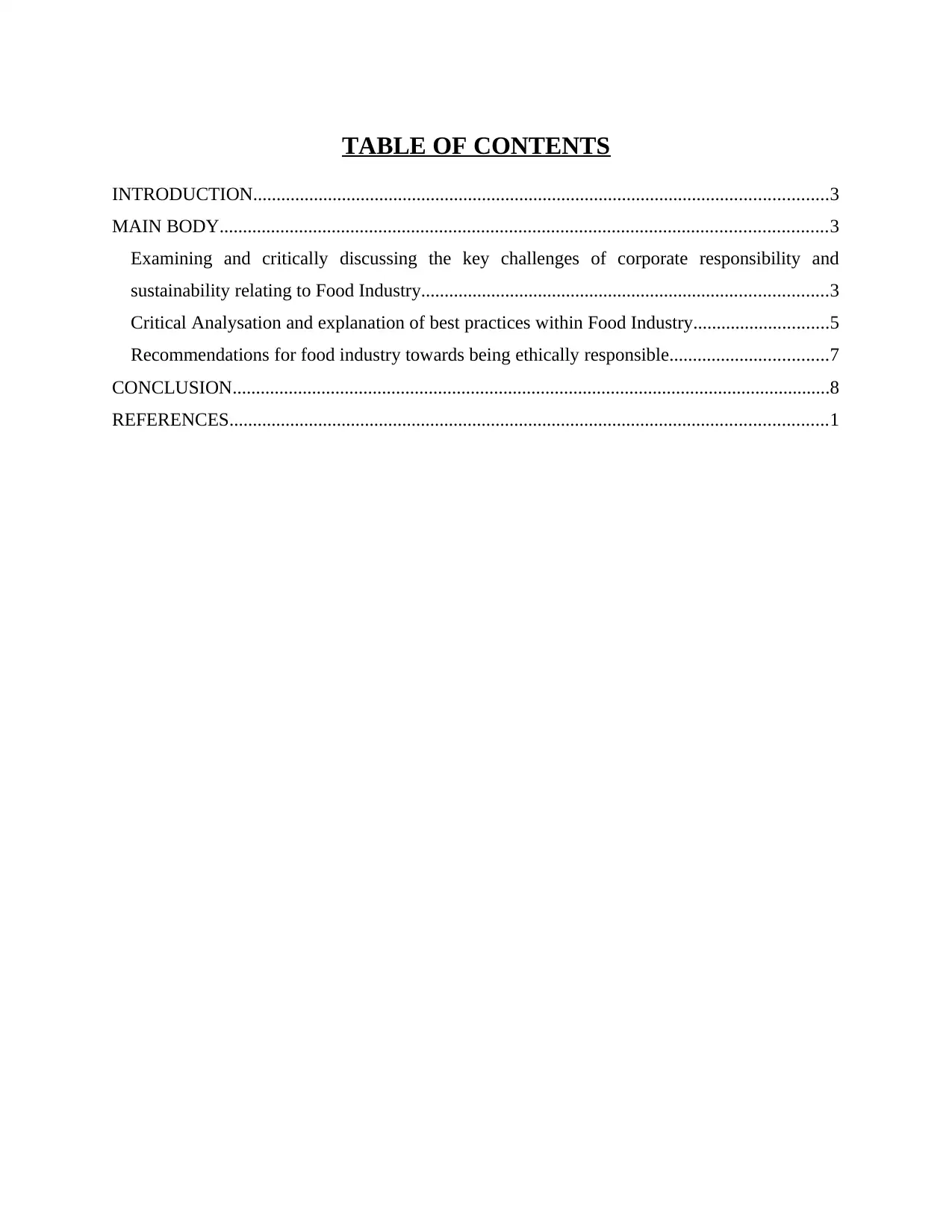
TABLE OF CONTENTS
INTRODUCTION...........................................................................................................................3
MAIN BODY..................................................................................................................................3
Examining and critically discussing the key challenges of corporate responsibility and
sustainability relating to Food Industry.......................................................................................3
Critical Analysation and explanation of best practices within Food Industry.............................5
Recommendations for food industry towards being ethically responsible..................................7
CONCLUSION................................................................................................................................8
REFERENCES................................................................................................................................1
INTRODUCTION...........................................................................................................................3
MAIN BODY..................................................................................................................................3
Examining and critically discussing the key challenges of corporate responsibility and
sustainability relating to Food Industry.......................................................................................3
Critical Analysation and explanation of best practices within Food Industry.............................5
Recommendations for food industry towards being ethically responsible..................................7
CONCLUSION................................................................................................................................8
REFERENCES................................................................................................................................1
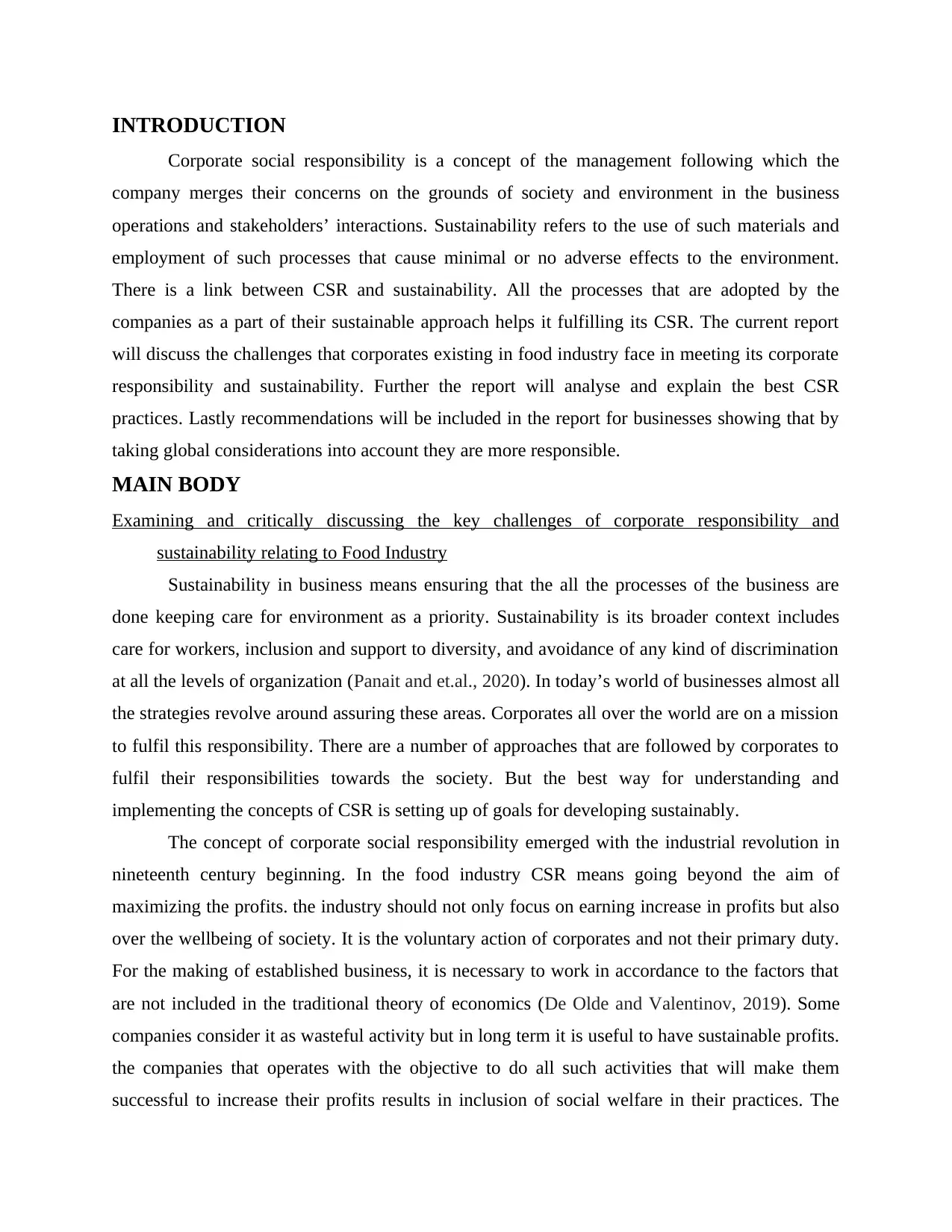
INTRODUCTION
Corporate social responsibility is a concept of the management following which the
company merges their concerns on the grounds of society and environment in the business
operations and stakeholders’ interactions. Sustainability refers to the use of such materials and
employment of such processes that cause minimal or no adverse effects to the environment.
There is a link between CSR and sustainability. All the processes that are adopted by the
companies as a part of their sustainable approach helps it fulfilling its CSR. The current report
will discuss the challenges that corporates existing in food industry face in meeting its corporate
responsibility and sustainability. Further the report will analyse and explain the best CSR
practices. Lastly recommendations will be included in the report for businesses showing that by
taking global considerations into account they are more responsible.
MAIN BODY
Examining and critically discussing the key challenges of corporate responsibility and
sustainability relating to Food Industry
Sustainability in business means ensuring that the all the processes of the business are
done keeping care for environment as a priority. Sustainability is its broader context includes
care for workers, inclusion and support to diversity, and avoidance of any kind of discrimination
at all the levels of organization (Panait and et.al., 2020). In today’s world of businesses almost all
the strategies revolve around assuring these areas. Corporates all over the world are on a mission
to fulfil this responsibility. There are a number of approaches that are followed by corporates to
fulfil their responsibilities towards the society. But the best way for understanding and
implementing the concepts of CSR is setting up of goals for developing sustainably.
The concept of corporate social responsibility emerged with the industrial revolution in
nineteenth century beginning. In the food industry CSR means going beyond the aim of
maximizing the profits. the industry should not only focus on earning increase in profits but also
over the wellbeing of society. It is the voluntary action of corporates and not their primary duty.
For the making of established business, it is necessary to work in accordance to the factors that
are not included in the traditional theory of economics (De Olde and Valentinov, 2019). Some
companies consider it as wasteful activity but in long term it is useful to have sustainable profits.
the companies that operates with the objective to do all such activities that will make them
successful to increase their profits results in inclusion of social welfare in their practices. The
Corporate social responsibility is a concept of the management following which the
company merges their concerns on the grounds of society and environment in the business
operations and stakeholders’ interactions. Sustainability refers to the use of such materials and
employment of such processes that cause minimal or no adverse effects to the environment.
There is a link between CSR and sustainability. All the processes that are adopted by the
companies as a part of their sustainable approach helps it fulfilling its CSR. The current report
will discuss the challenges that corporates existing in food industry face in meeting its corporate
responsibility and sustainability. Further the report will analyse and explain the best CSR
practices. Lastly recommendations will be included in the report for businesses showing that by
taking global considerations into account they are more responsible.
MAIN BODY
Examining and critically discussing the key challenges of corporate responsibility and
sustainability relating to Food Industry
Sustainability in business means ensuring that the all the processes of the business are
done keeping care for environment as a priority. Sustainability is its broader context includes
care for workers, inclusion and support to diversity, and avoidance of any kind of discrimination
at all the levels of organization (Panait and et.al., 2020). In today’s world of businesses almost all
the strategies revolve around assuring these areas. Corporates all over the world are on a mission
to fulfil this responsibility. There are a number of approaches that are followed by corporates to
fulfil their responsibilities towards the society. But the best way for understanding and
implementing the concepts of CSR is setting up of goals for developing sustainably.
The concept of corporate social responsibility emerged with the industrial revolution in
nineteenth century beginning. In the food industry CSR means going beyond the aim of
maximizing the profits. the industry should not only focus on earning increase in profits but also
over the wellbeing of society. It is the voluntary action of corporates and not their primary duty.
For the making of established business, it is necessary to work in accordance to the factors that
are not included in the traditional theory of economics (De Olde and Valentinov, 2019). Some
companies consider it as wasteful activity but in long term it is useful to have sustainable profits.
the companies that operates with the objective to do all such activities that will make them
successful to increase their profits results in inclusion of social welfare in their practices. The
⊘ This is a preview!⊘
Do you want full access?
Subscribe today to unlock all pages.

Trusted by 1+ million students worldwide
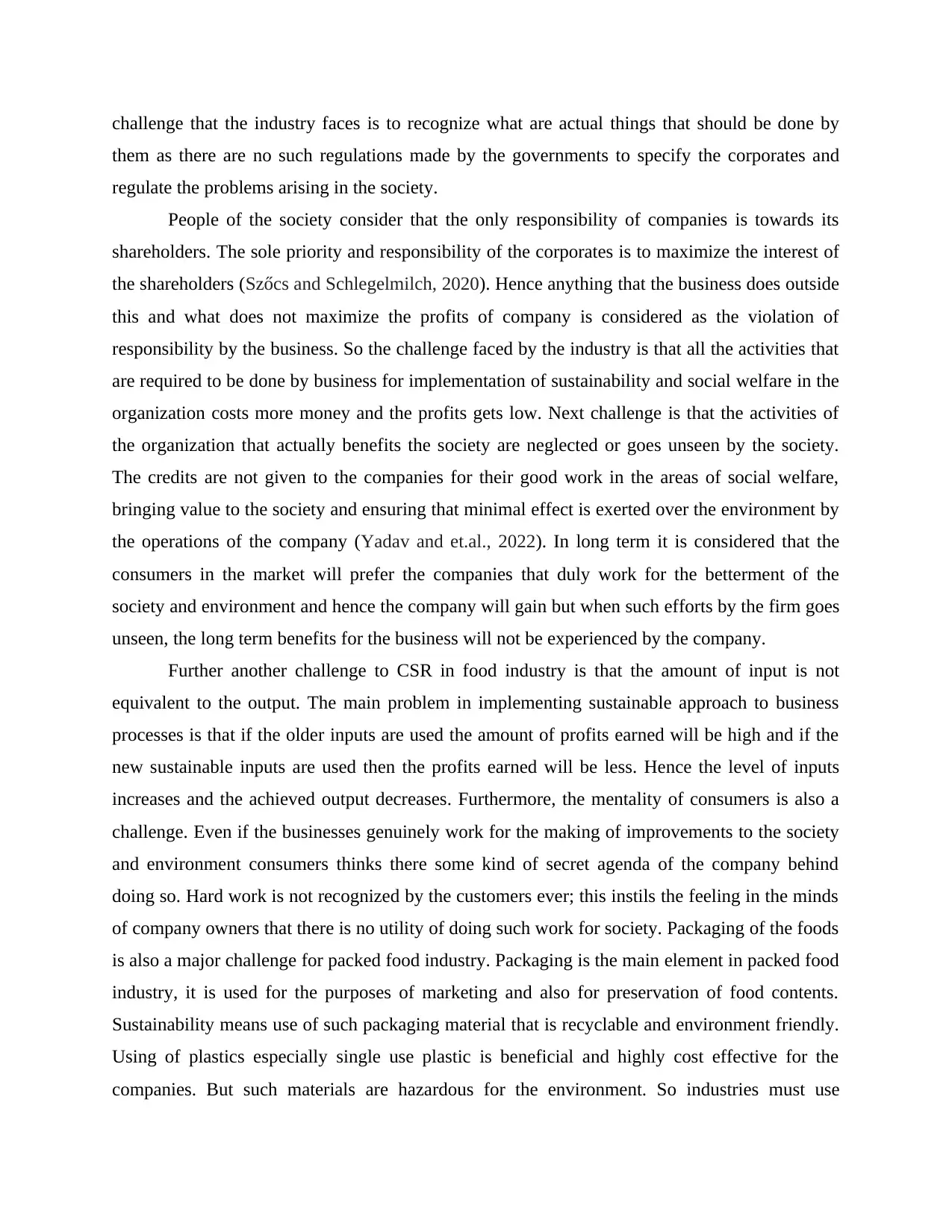
challenge that the industry faces is to recognize what are actual things that should be done by
them as there are no such regulations made by the governments to specify the corporates and
regulate the problems arising in the society.
People of the society consider that the only responsibility of companies is towards its
shareholders. The sole priority and responsibility of the corporates is to maximize the interest of
the shareholders (Szőcs and Schlegelmilch, 2020). Hence anything that the business does outside
this and what does not maximize the profits of company is considered as the violation of
responsibility by the business. So the challenge faced by the industry is that all the activities that
are required to be done by business for implementation of sustainability and social welfare in the
organization costs more money and the profits gets low. Next challenge is that the activities of
the organization that actually benefits the society are neglected or goes unseen by the society.
The credits are not given to the companies for their good work in the areas of social welfare,
bringing value to the society and ensuring that minimal effect is exerted over the environment by
the operations of the company (Yadav and et.al., 2022). In long term it is considered that the
consumers in the market will prefer the companies that duly work for the betterment of the
society and environment and hence the company will gain but when such efforts by the firm goes
unseen, the long term benefits for the business will not be experienced by the company.
Further another challenge to CSR in food industry is that the amount of input is not
equivalent to the output. The main problem in implementing sustainable approach to business
processes is that if the older inputs are used the amount of profits earned will be high and if the
new sustainable inputs are used then the profits earned will be less. Hence the level of inputs
increases and the achieved output decreases. Furthermore, the mentality of consumers is also a
challenge. Even if the businesses genuinely work for the making of improvements to the society
and environment consumers thinks there some kind of secret agenda of the company behind
doing so. Hard work is not recognized by the customers ever; this instils the feeling in the minds
of company owners that there is no utility of doing such work for society. Packaging of the foods
is also a major challenge for packed food industry. Packaging is the main element in packed food
industry, it is used for the purposes of marketing and also for preservation of food contents.
Sustainability means use of such packaging material that is recyclable and environment friendly.
Using of plastics especially single use plastic is beneficial and highly cost effective for the
companies. But such materials are hazardous for the environment. So industries must use
them as there are no such regulations made by the governments to specify the corporates and
regulate the problems arising in the society.
People of the society consider that the only responsibility of companies is towards its
shareholders. The sole priority and responsibility of the corporates is to maximize the interest of
the shareholders (Szőcs and Schlegelmilch, 2020). Hence anything that the business does outside
this and what does not maximize the profits of company is considered as the violation of
responsibility by the business. So the challenge faced by the industry is that all the activities that
are required to be done by business for implementation of sustainability and social welfare in the
organization costs more money and the profits gets low. Next challenge is that the activities of
the organization that actually benefits the society are neglected or goes unseen by the society.
The credits are not given to the companies for their good work in the areas of social welfare,
bringing value to the society and ensuring that minimal effect is exerted over the environment by
the operations of the company (Yadav and et.al., 2022). In long term it is considered that the
consumers in the market will prefer the companies that duly work for the betterment of the
society and environment and hence the company will gain but when such efforts by the firm goes
unseen, the long term benefits for the business will not be experienced by the company.
Further another challenge to CSR in food industry is that the amount of input is not
equivalent to the output. The main problem in implementing sustainable approach to business
processes is that if the older inputs are used the amount of profits earned will be high and if the
new sustainable inputs are used then the profits earned will be less. Hence the level of inputs
increases and the achieved output decreases. Furthermore, the mentality of consumers is also a
challenge. Even if the businesses genuinely work for the making of improvements to the society
and environment consumers thinks there some kind of secret agenda of the company behind
doing so. Hard work is not recognized by the customers ever; this instils the feeling in the minds
of company owners that there is no utility of doing such work for society. Packaging of the foods
is also a major challenge for packed food industry. Packaging is the main element in packed food
industry, it is used for the purposes of marketing and also for preservation of food contents.
Sustainability means use of such packaging material that is recyclable and environment friendly.
Using of plastics especially single use plastic is beneficial and highly cost effective for the
companies. But such materials are hazardous for the environment. So industries must use
Paraphrase This Document
Need a fresh take? Get an instant paraphrase of this document with our AI Paraphraser
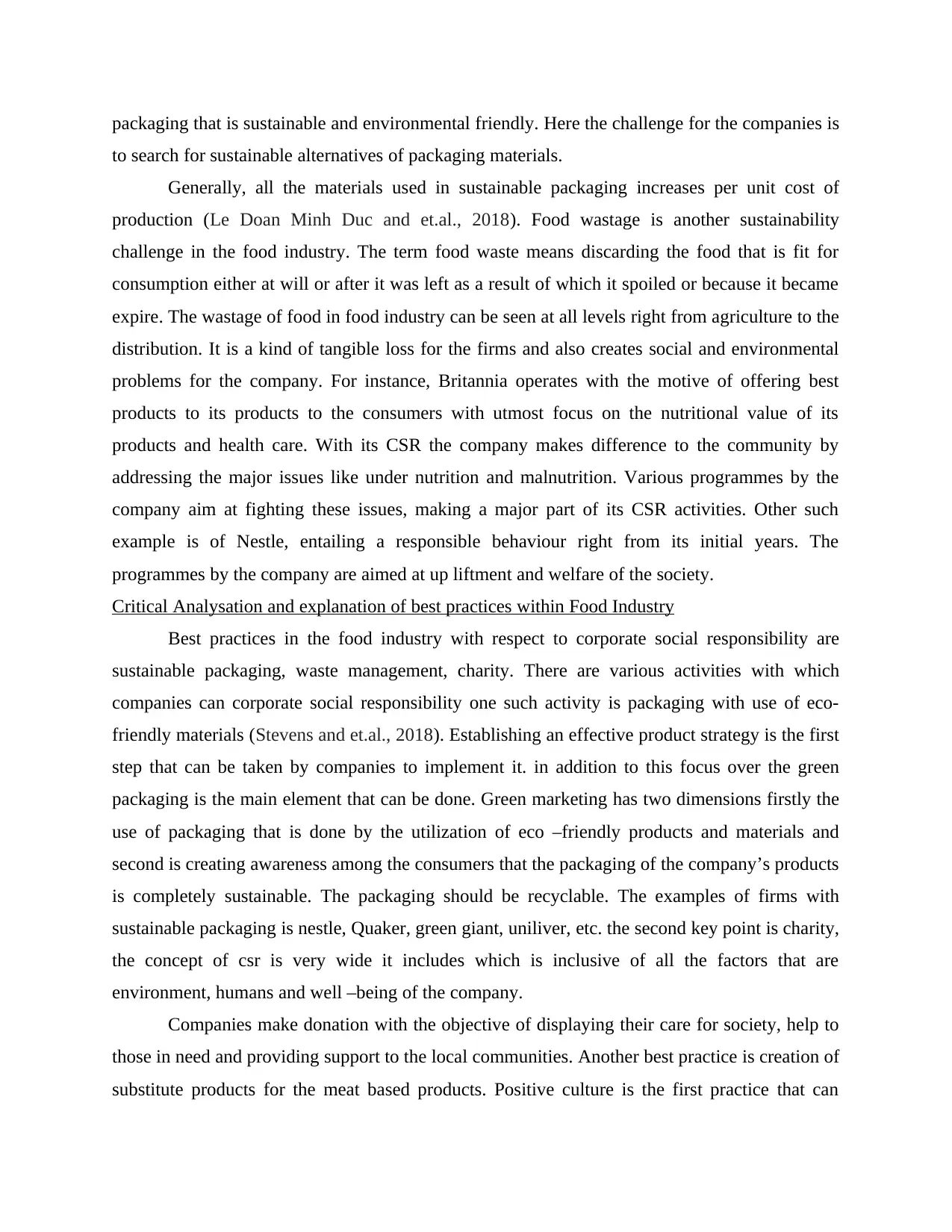
packaging that is sustainable and environmental friendly. Here the challenge for the companies is
to search for sustainable alternatives of packaging materials.
Generally, all the materials used in sustainable packaging increases per unit cost of
production (Le Doan Minh Duc and et.al., 2018). Food wastage is another sustainability
challenge in the food industry. The term food waste means discarding the food that is fit for
consumption either at will or after it was left as a result of which it spoiled or because it became
expire. The wastage of food in food industry can be seen at all levels right from agriculture to the
distribution. It is a kind of tangible loss for the firms and also creates social and environmental
problems for the company. For instance, Britannia operates with the motive of offering best
products to its products to the consumers with utmost focus on the nutritional value of its
products and health care. With its CSR the company makes difference to the community by
addressing the major issues like under nutrition and malnutrition. Various programmes by the
company aim at fighting these issues, making a major part of its CSR activities. Other such
example is of Nestle, entailing a responsible behaviour right from its initial years. The
programmes by the company are aimed at up liftment and welfare of the society.
Critical Analysation and explanation of best practices within Food Industry
Best practices in the food industry with respect to corporate social responsibility are
sustainable packaging, waste management, charity. There are various activities with which
companies can corporate social responsibility one such activity is packaging with use of eco-
friendly materials (Stevens and et.al., 2018). Establishing an effective product strategy is the first
step that can be taken by companies to implement it. in addition to this focus over the green
packaging is the main element that can be done. Green marketing has two dimensions firstly the
use of packaging that is done by the utilization of eco –friendly products and materials and
second is creating awareness among the consumers that the packaging of the company’s products
is completely sustainable. The packaging should be recyclable. The examples of firms with
sustainable packaging is nestle, Quaker, green giant, uniliver, etc. the second key point is charity,
the concept of csr is very wide it includes which is inclusive of all the factors that are
environment, humans and well –being of the company.
Companies make donation with the objective of displaying their care for society, help to
those in need and providing support to the local communities. Another best practice is creation of
substitute products for the meat based products. Positive culture is the first practice that can
to search for sustainable alternatives of packaging materials.
Generally, all the materials used in sustainable packaging increases per unit cost of
production (Le Doan Minh Duc and et.al., 2018). Food wastage is another sustainability
challenge in the food industry. The term food waste means discarding the food that is fit for
consumption either at will or after it was left as a result of which it spoiled or because it became
expire. The wastage of food in food industry can be seen at all levels right from agriculture to the
distribution. It is a kind of tangible loss for the firms and also creates social and environmental
problems for the company. For instance, Britannia operates with the motive of offering best
products to its products to the consumers with utmost focus on the nutritional value of its
products and health care. With its CSR the company makes difference to the community by
addressing the major issues like under nutrition and malnutrition. Various programmes by the
company aim at fighting these issues, making a major part of its CSR activities. Other such
example is of Nestle, entailing a responsible behaviour right from its initial years. The
programmes by the company are aimed at up liftment and welfare of the society.
Critical Analysation and explanation of best practices within Food Industry
Best practices in the food industry with respect to corporate social responsibility are
sustainable packaging, waste management, charity. There are various activities with which
companies can corporate social responsibility one such activity is packaging with use of eco-
friendly materials (Stevens and et.al., 2018). Establishing an effective product strategy is the first
step that can be taken by companies to implement it. in addition to this focus over the green
packaging is the main element that can be done. Green marketing has two dimensions firstly the
use of packaging that is done by the utilization of eco –friendly products and materials and
second is creating awareness among the consumers that the packaging of the company’s products
is completely sustainable. The packaging should be recyclable. The examples of firms with
sustainable packaging is nestle, Quaker, green giant, uniliver, etc. the second key point is charity,
the concept of csr is very wide it includes which is inclusive of all the factors that are
environment, humans and well –being of the company.
Companies make donation with the objective of displaying their care for society, help to
those in need and providing support to the local communities. Another best practice is creation of
substitute products for the meat based products. Positive culture is the first practice that can
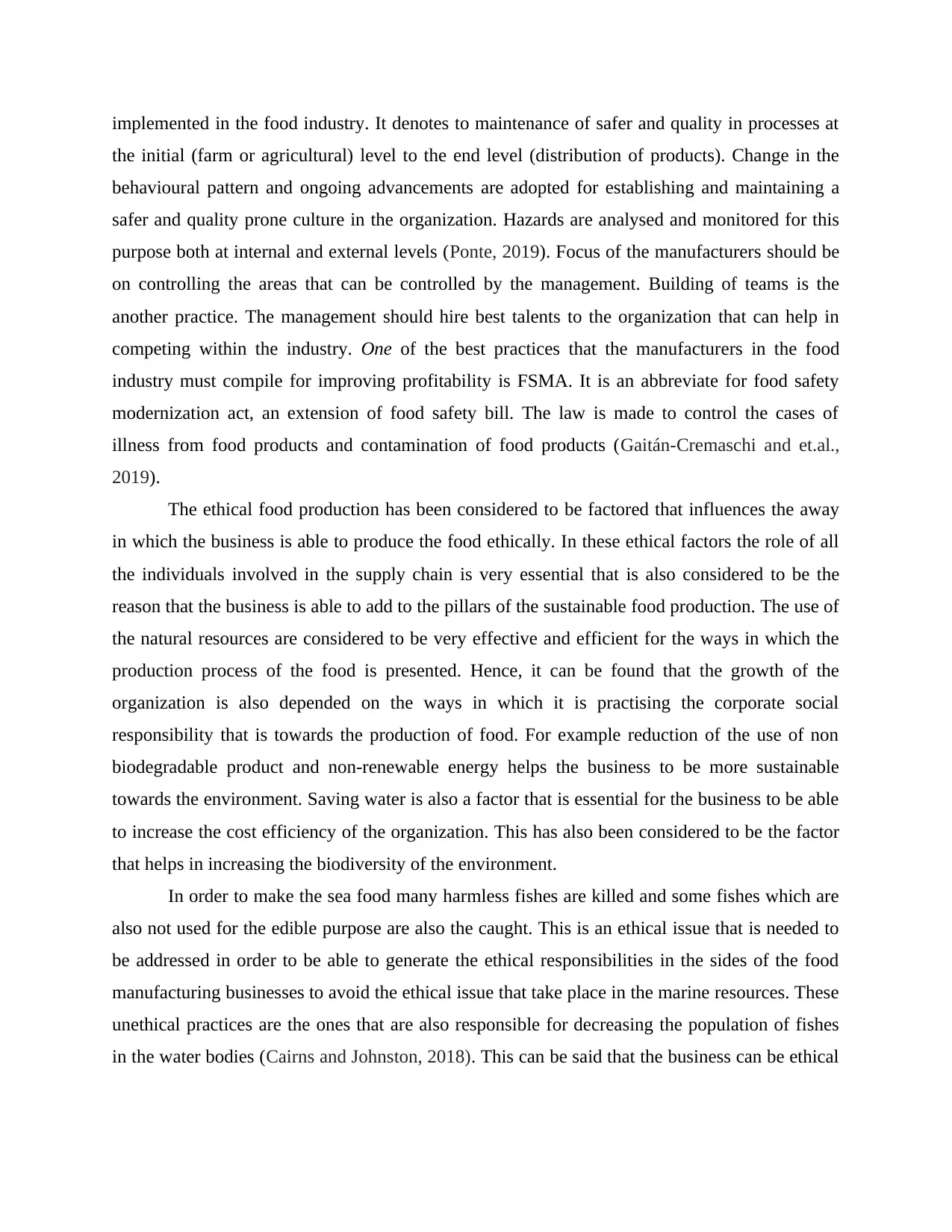
implemented in the food industry. It denotes to maintenance of safer and quality in processes at
the initial (farm or agricultural) level to the end level (distribution of products). Change in the
behavioural pattern and ongoing advancements are adopted for establishing and maintaining a
safer and quality prone culture in the organization. Hazards are analysed and monitored for this
purpose both at internal and external levels (Ponte, 2019). Focus of the manufacturers should be
on controlling the areas that can be controlled by the management. Building of teams is the
another practice. The management should hire best talents to the organization that can help in
competing within the industry. One of the best practices that the manufacturers in the food
industry must compile for improving profitability is FSMA. It is an abbreviate for food safety
modernization act, an extension of food safety bill. The law is made to control the cases of
illness from food products and contamination of food products (Gaitán-Cremaschi and et.al.,
2019).
The ethical food production has been considered to be factored that influences the away
in which the business is able to produce the food ethically. In these ethical factors the role of all
the individuals involved in the supply chain is very essential that is also considered to be the
reason that the business is able to add to the pillars of the sustainable food production. The use of
the natural resources are considered to be very effective and efficient for the ways in which the
production process of the food is presented. Hence, it can be found that the growth of the
organization is also depended on the ways in which it is practising the corporate social
responsibility that is towards the production of food. For example reduction of the use of non
biodegradable product and non-renewable energy helps the business to be more sustainable
towards the environment. Saving water is also a factor that is essential for the business to be able
to increase the cost efficiency of the organization. This has also been considered to be the factor
that helps in increasing the biodiversity of the environment.
In order to make the sea food many harmless fishes are killed and some fishes which are
also not used for the edible purpose are also the caught. This is an ethical issue that is needed to
be addressed in order to be able to generate the ethical responsibilities in the sides of the food
manufacturing businesses to avoid the ethical issue that take place in the marine resources. These
unethical practices are the ones that are also responsible for decreasing the population of fishes
in the water bodies (Cairns and Johnston, 2018). This can be said that the business can be ethical
the initial (farm or agricultural) level to the end level (distribution of products). Change in the
behavioural pattern and ongoing advancements are adopted for establishing and maintaining a
safer and quality prone culture in the organization. Hazards are analysed and monitored for this
purpose both at internal and external levels (Ponte, 2019). Focus of the manufacturers should be
on controlling the areas that can be controlled by the management. Building of teams is the
another practice. The management should hire best talents to the organization that can help in
competing within the industry. One of the best practices that the manufacturers in the food
industry must compile for improving profitability is FSMA. It is an abbreviate for food safety
modernization act, an extension of food safety bill. The law is made to control the cases of
illness from food products and contamination of food products (Gaitán-Cremaschi and et.al.,
2019).
The ethical food production has been considered to be factored that influences the away
in which the business is able to produce the food ethically. In these ethical factors the role of all
the individuals involved in the supply chain is very essential that is also considered to be the
reason that the business is able to add to the pillars of the sustainable food production. The use of
the natural resources are considered to be very effective and efficient for the ways in which the
production process of the food is presented. Hence, it can be found that the growth of the
organization is also depended on the ways in which it is practising the corporate social
responsibility that is towards the production of food. For example reduction of the use of non
biodegradable product and non-renewable energy helps the business to be more sustainable
towards the environment. Saving water is also a factor that is essential for the business to be able
to increase the cost efficiency of the organization. This has also been considered to be the factor
that helps in increasing the biodiversity of the environment.
In order to make the sea food many harmless fishes are killed and some fishes which are
also not used for the edible purpose are also the caught. This is an ethical issue that is needed to
be addressed in order to be able to generate the ethical responsibilities in the sides of the food
manufacturing businesses to avoid the ethical issue that take place in the marine resources. These
unethical practices are the ones that are also responsible for decreasing the population of fishes
in the water bodies (Cairns and Johnston, 2018). This can be said that the business can be ethical
⊘ This is a preview!⊘
Do you want full access?
Subscribe today to unlock all pages.

Trusted by 1+ million students worldwide
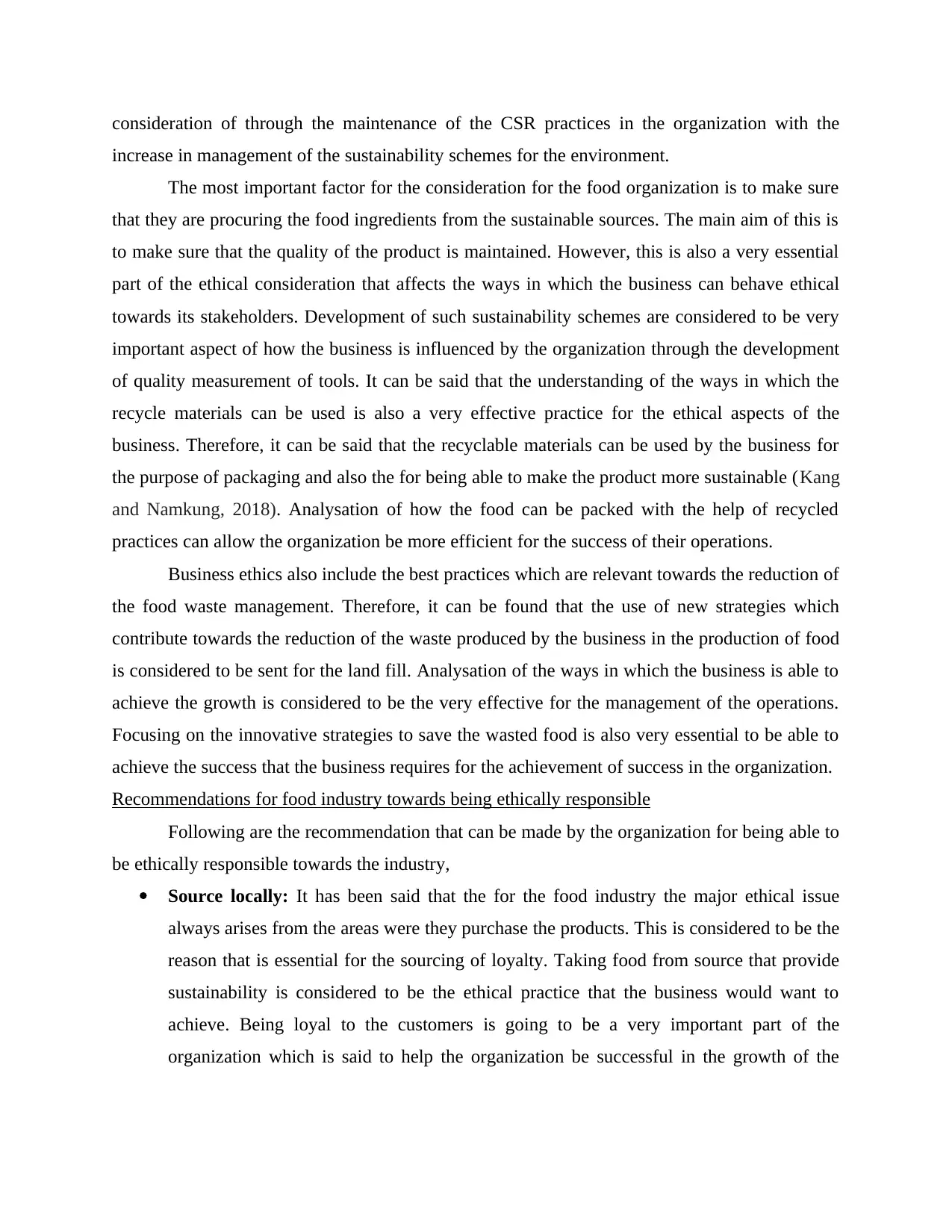
consideration of through the maintenance of the CSR practices in the organization with the
increase in management of the sustainability schemes for the environment.
The most important factor for the consideration for the food organization is to make sure
that they are procuring the food ingredients from the sustainable sources. The main aim of this is
to make sure that the quality of the product is maintained. However, this is also a very essential
part of the ethical consideration that affects the ways in which the business can behave ethical
towards its stakeholders. Development of such sustainability schemes are considered to be very
important aspect of how the business is influenced by the organization through the development
of quality measurement of tools. It can be said that the understanding of the ways in which the
recycle materials can be used is also a very effective practice for the ethical aspects of the
business. Therefore, it can be said that the recyclable materials can be used by the business for
the purpose of packaging and also the for being able to make the product more sustainable (Kang
and Namkung, 2018). Analysation of how the food can be packed with the help of recycled
practices can allow the organization be more efficient for the success of their operations.
Business ethics also include the best practices which are relevant towards the reduction of
the food waste management. Therefore, it can be found that the use of new strategies which
contribute towards the reduction of the waste produced by the business in the production of food
is considered to be sent for the land fill. Analysation of the ways in which the business is able to
achieve the growth is considered to be the very effective for the management of the operations.
Focusing on the innovative strategies to save the wasted food is also very essential to be able to
achieve the success that the business requires for the achievement of success in the organization.
Recommendations for food industry towards being ethically responsible
Following are the recommendation that can be made by the organization for being able to
be ethically responsible towards the industry,
Source locally: It has been said that the for the food industry the major ethical issue
always arises from the areas were they purchase the products. This is considered to be the
reason that is essential for the sourcing of loyalty. Taking food from source that provide
sustainability is considered to be the ethical practice that the business would want to
achieve. Being loyal to the customers is going to be a very important part of the
organization which is said to help the organization be successful in the growth of the
increase in management of the sustainability schemes for the environment.
The most important factor for the consideration for the food organization is to make sure
that they are procuring the food ingredients from the sustainable sources. The main aim of this is
to make sure that the quality of the product is maintained. However, this is also a very essential
part of the ethical consideration that affects the ways in which the business can behave ethical
towards its stakeholders. Development of such sustainability schemes are considered to be very
important aspect of how the business is influenced by the organization through the development
of quality measurement of tools. It can be said that the understanding of the ways in which the
recycle materials can be used is also a very effective practice for the ethical aspects of the
business. Therefore, it can be said that the recyclable materials can be used by the business for
the purpose of packaging and also the for being able to make the product more sustainable (Kang
and Namkung, 2018). Analysation of how the food can be packed with the help of recycled
practices can allow the organization be more efficient for the success of their operations.
Business ethics also include the best practices which are relevant towards the reduction of
the food waste management. Therefore, it can be found that the use of new strategies which
contribute towards the reduction of the waste produced by the business in the production of food
is considered to be sent for the land fill. Analysation of the ways in which the business is able to
achieve the growth is considered to be the very effective for the management of the operations.
Focusing on the innovative strategies to save the wasted food is also very essential to be able to
achieve the success that the business requires for the achievement of success in the organization.
Recommendations for food industry towards being ethically responsible
Following are the recommendation that can be made by the organization for being able to
be ethically responsible towards the industry,
Source locally: It has been said that the for the food industry the major ethical issue
always arises from the areas were they purchase the products. This is considered to be the
reason that is essential for the sourcing of loyalty. Taking food from source that provide
sustainability is considered to be the ethical practice that the business would want to
achieve. Being loyal to the customers is going to be a very important part of the
organization which is said to help the organization be successful in the growth of the
Paraphrase This Document
Need a fresh take? Get an instant paraphrase of this document with our AI Paraphraser
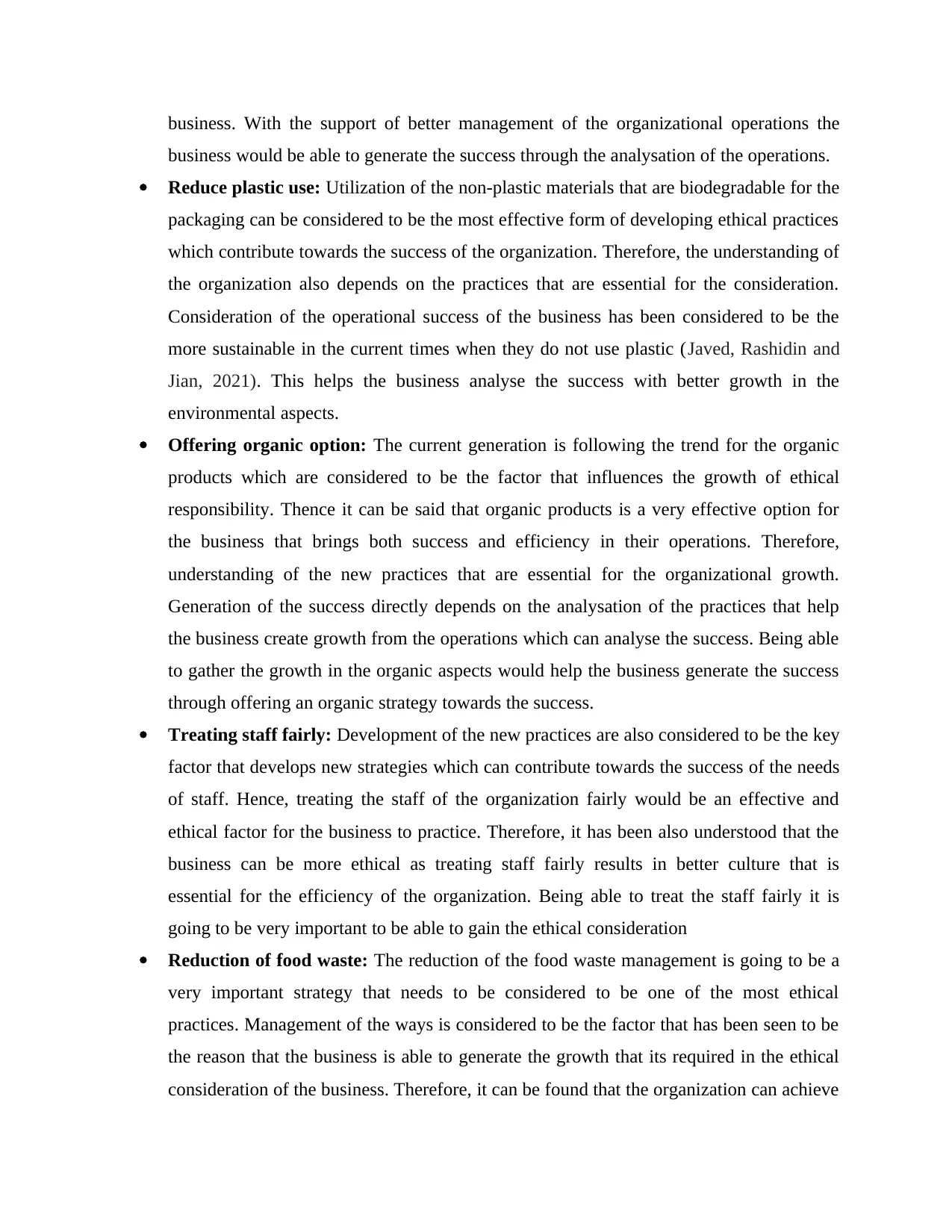
business. With the support of better management of the organizational operations the
business would be able to generate the success through the analysation of the operations.
Reduce plastic use: Utilization of the non-plastic materials that are biodegradable for the
packaging can be considered to be the most effective form of developing ethical practices
which contribute towards the success of the organization. Therefore, the understanding of
the organization also depends on the practices that are essential for the consideration.
Consideration of the operational success of the business has been considered to be the
more sustainable in the current times when they do not use plastic (Javed, Rashidin and
Jian, 2021). This helps the business analyse the success with better growth in the
environmental aspects.
Offering organic option: The current generation is following the trend for the organic
products which are considered to be the factor that influences the growth of ethical
responsibility. Thence it can be said that organic products is a very effective option for
the business that brings both success and efficiency in their operations. Therefore,
understanding of the new practices that are essential for the organizational growth.
Generation of the success directly depends on the analysation of the practices that help
the business create growth from the operations which can analyse the success. Being able
to gather the growth in the organic aspects would help the business generate the success
through offering an organic strategy towards the success.
Treating staff fairly: Development of the new practices are also considered to be the key
factor that develops new strategies which can contribute towards the success of the needs
of staff. Hence, treating the staff of the organization fairly would be an effective and
ethical factor for the business to practice. Therefore, it has been also understood that the
business can be more ethical as treating staff fairly results in better culture that is
essential for the efficiency of the organization. Being able to treat the staff fairly it is
going to be very important to be able to gain the ethical consideration
Reduction of food waste: The reduction of the food waste management is going to be a
very important strategy that needs to be considered to be one of the most ethical
practices. Management of the ways is considered to be the factor that has been seen to be
the reason that the business is able to generate the growth that its required in the ethical
consideration of the business. Therefore, it can be found that the organization can achieve
business would be able to generate the success through the analysation of the operations.
Reduce plastic use: Utilization of the non-plastic materials that are biodegradable for the
packaging can be considered to be the most effective form of developing ethical practices
which contribute towards the success of the organization. Therefore, the understanding of
the organization also depends on the practices that are essential for the consideration.
Consideration of the operational success of the business has been considered to be the
more sustainable in the current times when they do not use plastic (Javed, Rashidin and
Jian, 2021). This helps the business analyse the success with better growth in the
environmental aspects.
Offering organic option: The current generation is following the trend for the organic
products which are considered to be the factor that influences the growth of ethical
responsibility. Thence it can be said that organic products is a very effective option for
the business that brings both success and efficiency in their operations. Therefore,
understanding of the new practices that are essential for the organizational growth.
Generation of the success directly depends on the analysation of the practices that help
the business create growth from the operations which can analyse the success. Being able
to gather the growth in the organic aspects would help the business generate the success
through offering an organic strategy towards the success.
Treating staff fairly: Development of the new practices are also considered to be the key
factor that develops new strategies which can contribute towards the success of the needs
of staff. Hence, treating the staff of the organization fairly would be an effective and
ethical factor for the business to practice. Therefore, it has been also understood that the
business can be more ethical as treating staff fairly results in better culture that is
essential for the efficiency of the organization. Being able to treat the staff fairly it is
going to be very important to be able to gain the ethical consideration
Reduction of food waste: The reduction of the food waste management is going to be a
very important strategy that needs to be considered to be one of the most ethical
practices. Management of the ways is considered to be the factor that has been seen to be
the reason that the business is able to generate the growth that its required in the ethical
consideration of the business. Therefore, it can be found that the organization can achieve
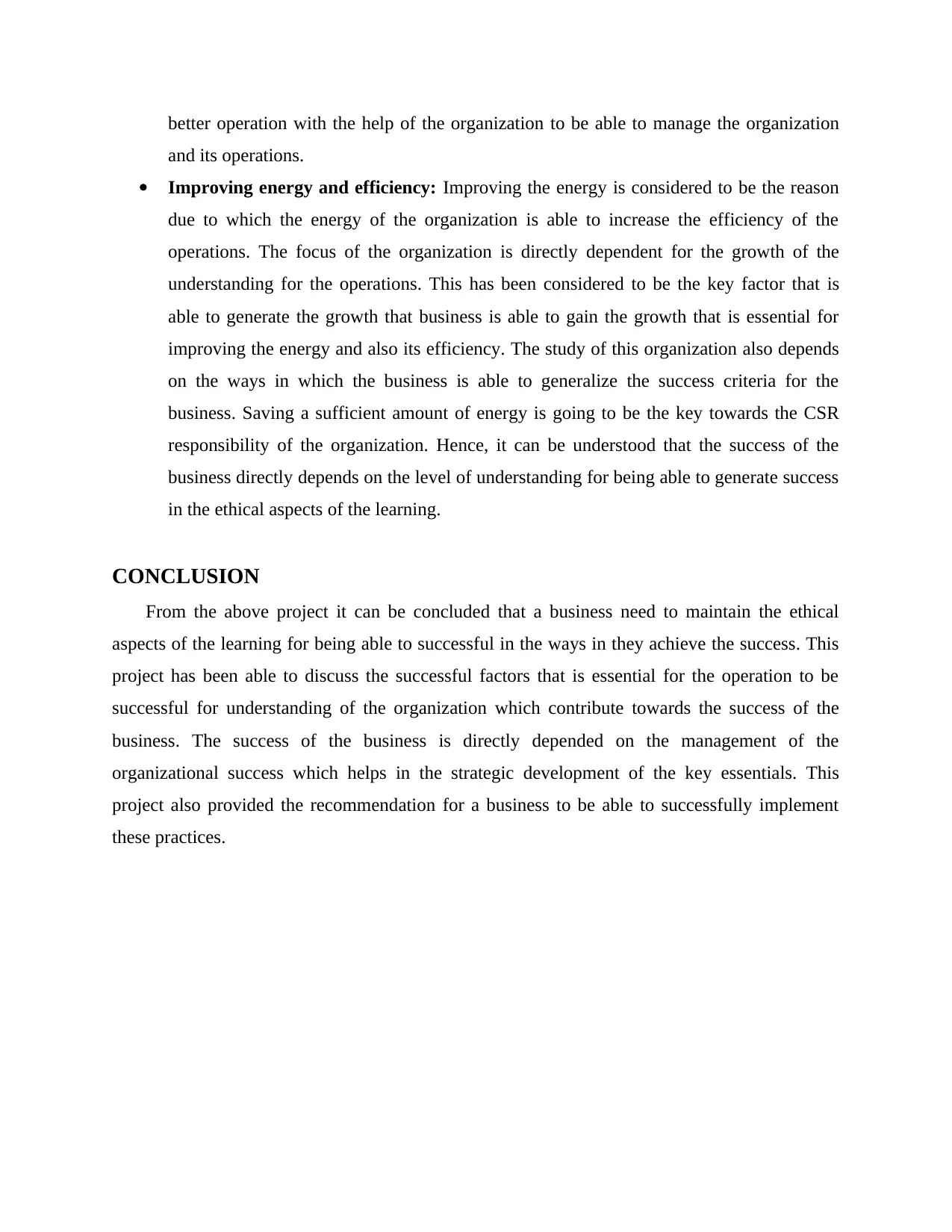
better operation with the help of the organization to be able to manage the organization
and its operations.
Improving energy and efficiency: Improving the energy is considered to be the reason
due to which the energy of the organization is able to increase the efficiency of the
operations. The focus of the organization is directly dependent for the growth of the
understanding for the operations. This has been considered to be the key factor that is
able to generate the growth that business is able to gain the growth that is essential for
improving the energy and also its efficiency. The study of this organization also depends
on the ways in which the business is able to generalize the success criteria for the
business. Saving a sufficient amount of energy is going to be the key towards the CSR
responsibility of the organization. Hence, it can be understood that the success of the
business directly depends on the level of understanding for being able to generate success
in the ethical aspects of the learning.
CONCLUSION
From the above project it can be concluded that a business need to maintain the ethical
aspects of the learning for being able to successful in the ways in they achieve the success. This
project has been able to discuss the successful factors that is essential for the operation to be
successful for understanding of the organization which contribute towards the success of the
business. The success of the business is directly depended on the management of the
organizational success which helps in the strategic development of the key essentials. This
project also provided the recommendation for a business to be able to successfully implement
these practices.
and its operations.
Improving energy and efficiency: Improving the energy is considered to be the reason
due to which the energy of the organization is able to increase the efficiency of the
operations. The focus of the organization is directly dependent for the growth of the
understanding for the operations. This has been considered to be the key factor that is
able to generate the growth that business is able to gain the growth that is essential for
improving the energy and also its efficiency. The study of this organization also depends
on the ways in which the business is able to generalize the success criteria for the
business. Saving a sufficient amount of energy is going to be the key towards the CSR
responsibility of the organization. Hence, it can be understood that the success of the
business directly depends on the level of understanding for being able to generate success
in the ethical aspects of the learning.
CONCLUSION
From the above project it can be concluded that a business need to maintain the ethical
aspects of the learning for being able to successful in the ways in they achieve the success. This
project has been able to discuss the successful factors that is essential for the operation to be
successful for understanding of the organization which contribute towards the success of the
business. The success of the business is directly depended on the management of the
organizational success which helps in the strategic development of the key essentials. This
project also provided the recommendation for a business to be able to successfully implement
these practices.
⊘ This is a preview!⊘
Do you want full access?
Subscribe today to unlock all pages.

Trusted by 1+ million students worldwide
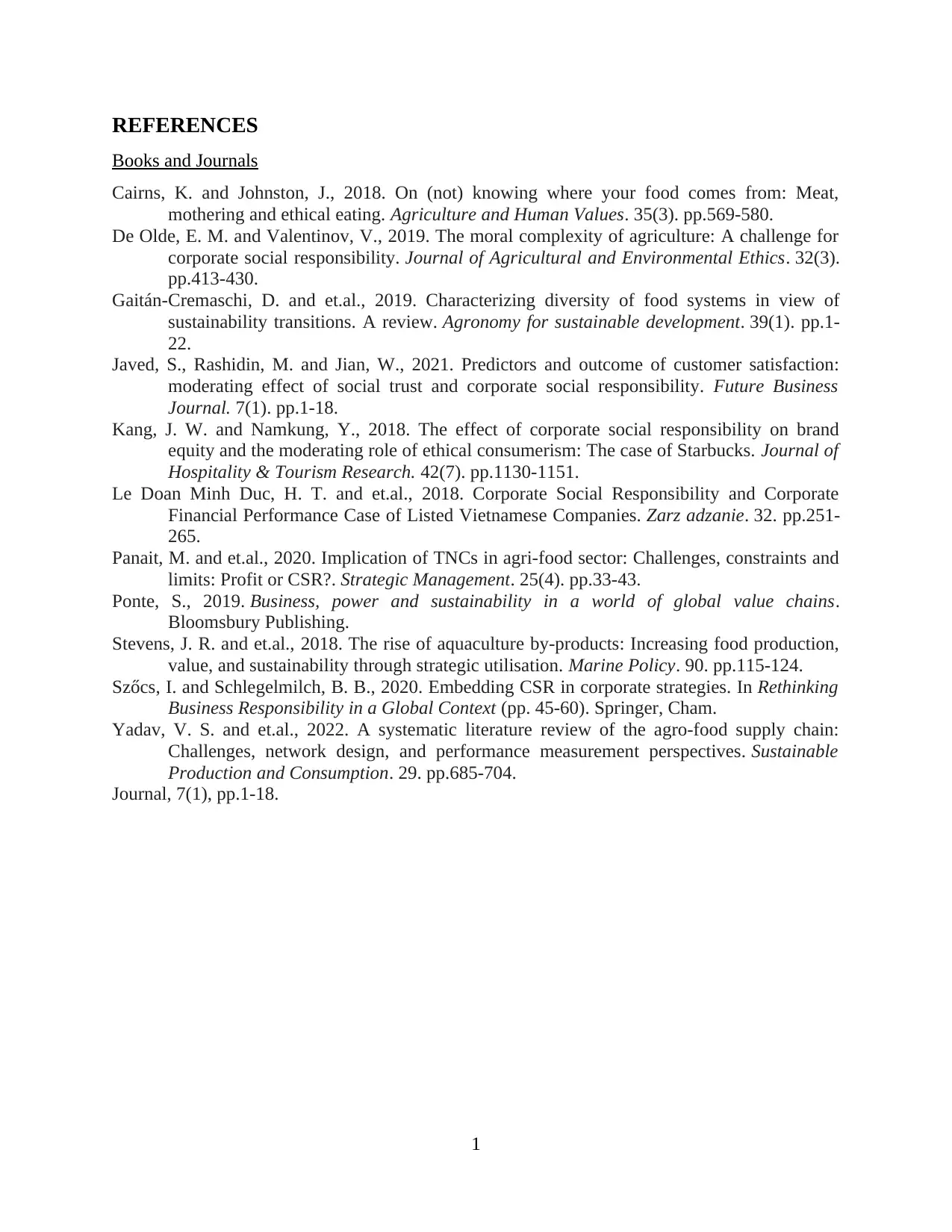
REFERENCES
Books and Journals
Cairns, K. and Johnston, J., 2018. On (not) knowing where your food comes from: Meat,
mothering and ethical eating. Agriculture and Human Values. 35(3). pp.569-580.
De Olde, E. M. and Valentinov, V., 2019. The moral complexity of agriculture: A challenge for
corporate social responsibility. Journal of Agricultural and Environmental Ethics. 32(3).
pp.413-430.
Gaitán-Cremaschi, D. and et.al., 2019. Characterizing diversity of food systems in view of
sustainability transitions. A review. Agronomy for sustainable development. 39(1). pp.1-
22.
Javed, S., Rashidin, M. and Jian, W., 2021. Predictors and outcome of customer satisfaction:
moderating effect of social trust and corporate social responsibility. Future Business
Journal. 7(1). pp.1-18.
Kang, J. W. and Namkung, Y., 2018. The effect of corporate social responsibility on brand
equity and the moderating role of ethical consumerism: The case of Starbucks. Journal of
Hospitality & Tourism Research. 42(7). pp.1130-1151.
Le Doan Minh Duc, H. T. and et.al., 2018. Corporate Social Responsibility and Corporate
Financial Performance Case of Listed Vietnamese Companies. Zarz adzanie. 32. pp.251-
265.
Panait, M. and et.al., 2020. Implication of TNCs in agri-food sector: Challenges, constraints and
limits: Profit or CSR?. Strategic Management. 25(4). pp.33-43.
Ponte, S., 2019. Business, power and sustainability in a world of global value chains.
Bloomsbury Publishing.
Stevens, J. R. and et.al., 2018. The rise of aquaculture by-products: Increasing food production,
value, and sustainability through strategic utilisation. Marine Policy. 90. pp.115-124.
Szőcs, I. and Schlegelmilch, B. B., 2020. Embedding CSR in corporate strategies. In Rethinking
Business Responsibility in a Global Context (pp. 45-60). Springer, Cham.
Yadav, V. S. and et.al., 2022. A systematic literature review of the agro-food supply chain:
Challenges, network design, and performance measurement perspectives. Sustainable
Production and Consumption. 29. pp.685-704.
Journal, 7(1), pp.1-18.
1
Books and Journals
Cairns, K. and Johnston, J., 2018. On (not) knowing where your food comes from: Meat,
mothering and ethical eating. Agriculture and Human Values. 35(3). pp.569-580.
De Olde, E. M. and Valentinov, V., 2019. The moral complexity of agriculture: A challenge for
corporate social responsibility. Journal of Agricultural and Environmental Ethics. 32(3).
pp.413-430.
Gaitán-Cremaschi, D. and et.al., 2019. Characterizing diversity of food systems in view of
sustainability transitions. A review. Agronomy for sustainable development. 39(1). pp.1-
22.
Javed, S., Rashidin, M. and Jian, W., 2021. Predictors and outcome of customer satisfaction:
moderating effect of social trust and corporate social responsibility. Future Business
Journal. 7(1). pp.1-18.
Kang, J. W. and Namkung, Y., 2018. The effect of corporate social responsibility on brand
equity and the moderating role of ethical consumerism: The case of Starbucks. Journal of
Hospitality & Tourism Research. 42(7). pp.1130-1151.
Le Doan Minh Duc, H. T. and et.al., 2018. Corporate Social Responsibility and Corporate
Financial Performance Case of Listed Vietnamese Companies. Zarz adzanie. 32. pp.251-
265.
Panait, M. and et.al., 2020. Implication of TNCs in agri-food sector: Challenges, constraints and
limits: Profit or CSR?. Strategic Management. 25(4). pp.33-43.
Ponte, S., 2019. Business, power and sustainability in a world of global value chains.
Bloomsbury Publishing.
Stevens, J. R. and et.al., 2018. The rise of aquaculture by-products: Increasing food production,
value, and sustainability through strategic utilisation. Marine Policy. 90. pp.115-124.
Szőcs, I. and Schlegelmilch, B. B., 2020. Embedding CSR in corporate strategies. In Rethinking
Business Responsibility in a Global Context (pp. 45-60). Springer, Cham.
Yadav, V. S. and et.al., 2022. A systematic literature review of the agro-food supply chain:
Challenges, network design, and performance measurement perspectives. Sustainable
Production and Consumption. 29. pp.685-704.
Journal, 7(1), pp.1-18.
1
1 out of 10
Related Documents
Your All-in-One AI-Powered Toolkit for Academic Success.
+13062052269
info@desklib.com
Available 24*7 on WhatsApp / Email
![[object Object]](/_next/static/media/star-bottom.7253800d.svg)
Unlock your academic potential
Copyright © 2020–2026 A2Z Services. All Rights Reserved. Developed and managed by ZUCOL.





